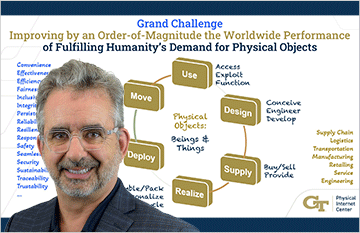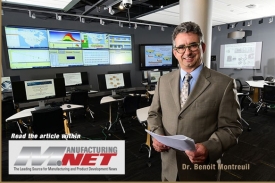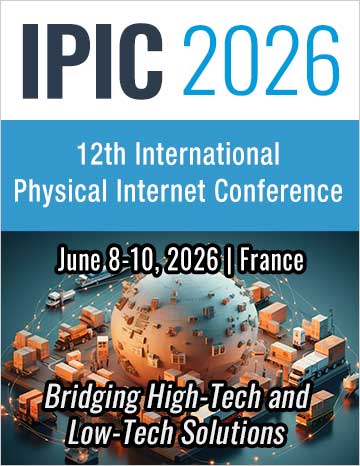The way physical objects are currently transported, handled, stored, realized, supplied and used throughout the world is not sustainable economically, environmentally and socially. This unsustainability assertion, supported through numerous symptoms, reveals a harsh reality. Addressing this global unsustainability is a worldwide grand challenge with a goal of enabling the global sustainability of physical object mobility (transportation, handling), storage, realization (production, assembly, finishing, refurbishing and recycling), supply and usage.
From an economical perspective, the goal is to unlock highly significant gains in global logistics, production, transportation and business productivity. From an environmental perspective, the goal is to reduce by an order of magnitude the global energy consumption, direct and indirect pollution, including greenhouse gas emission, associated with logistics, production and transportation. From a societal perspective, the goal is to significantly increase the quality of life of the logistic, production and transportation workers, as well as of the overall population by making much more accessible across the world the objects and functionality they need and value.
This global logistics sustainability grand challenge cannot be addressed through the same lenses that have created the situation and the current logistics paradigm must be replaced by a new paradigm enabling outside-the-box meta-systemic creative thinking. This new paradigm has driven the evolution of the "Physical Internet", a global logistics system based on the interconnection of logistic networks by a standardized set of collaboration protocols, modular containers, and smart interfaces for increased efficiency and sustainability. Driven by innovation, the Physical Internet enables a worldwide Logistics Web and tranforms the way physical objects are designed, used, realized, supplied, stored and moved around the world.
Fundamental Research Areas
Our faculty and students are involved in fundamental research in almost all aspects of supply chain including:
- Hyperconnected Manufacturing
- Hyperconnected Distribution
- Hyperconnected City Logistics
- Humanitarian Supply Chains
- Omni-channel Supply Chains
- Supply Chain Disruptions Management
- Utility Networks
Main Application Areas
- Automotive Industry
- Manufacturing Industry
- Retail Industry
- Technology Industry
- Transportation Industry
External Collaborators
A sampling of research is sponsored by various industries and government agencies including:
About Benoit Montreuil

Dr. Benoit Montreuil leads Georgia Tech's initiatives to develop the cutting edge knowledge required to design and operate the globally emerging "Physical Internet". His main research interests lie in developing concepts, methodologies and technologies for creating, optimizing, transforming and enabling businesses and value creation networks to thrive in a fast evolving world. He stands at the crossroads of industrial and systems engineering, operations research, computer science and operations, logistics, supply chain, strategic management.

"The Physical Internet Will Rest On The Internet Of Things" appeared in Manufacturing.net discussing the Physical Internet initiative and how it can be used as an approach in rethinking the global supply chain.
